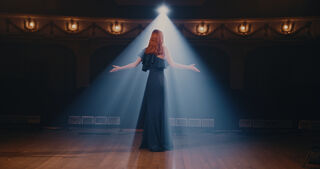Play
Stepping Outside the Theatre of One’s Self for Greater Personal Power
"See" yourself in action.
Posted September 10, 2021 Reviewed by Ekua Hagan
Key points
- In their daily interactions, many people step into the "theatre" where they play a role, usually unknowingly.
- “Seeing” oneself from an objective, outsider seat sheds light on how one sabotages a relationship or prevents one's needs from being met.
- Learning to step back from oneself reduces reactivity and adds to one's personal power.

I was very fortunate to have an amazing trainer when I became a certified hypnotherapist and certified hypnosis trainer in the early ’90s. Dr. Richard Harte was the best of the best—a teacher, mentor and friend. He had a concept he often talked about—“the theatre of one’s self”—and I’ve used this in many of my own teachings. This article is dedicated to Dr. Harte, who passed away far too young.
Every day, you get out of bed at some point, put your feet on the floor and get ready to face the day. The thing you might not realize is that you also put on your mask—in order to step into your theatre. What role will you play today? Will you be the long-suffering, put-upon husband or wife? The martyr mother? The overworked father? The child of parents who were not very good at raising you? The person who needs to let everyone know they have a chip on their shoulder? The kind one? The caring one? The resentful one?
Each and every moment of your daily interactions, you step into the theatre where (mostly unknowingly) you play a role. You are in conversation with your children, your parents, your friends, significant others and strangers you meet along the way, and all the time you are stepping into the theatre and slipping into costume. If you have ever had someone you know say, “Here she/he goes again…” then you know they are reacting and responding to the particular role you have assumed. Of course, people don’t see the role they are playing; they just react to the inference that they are doing something wrong.
The idea of practicing with the theatre of one’s self is that right in the middle of a dialogue with someone, or when you are about to say the thing you’ve said a hundred times before, or when you can’t wait for the person to finish their sentence so you can jump with your retort, rather than doing this, you “step outside” the exchange and watch what is happening. You actually have the chance to see yourself in action and in doing so, you can make a choice to stop and go in a different direction.
Benefits of seeing yourself from the "outsider" seat
Stepping out of the theatre of one’s self gives you choices. It gives you options. It allows you to interact with people in an entirely new manner, rather than staying in the same grooves over and over again, which oftentimes keep you stuck and frustrated. “Seeing” yourself from the objective, outsider seat allows you to see the ways in which you might sabotage a relationship or prevent yourself from getting what you need from the other person.
The theatre has the added benefit of giving you a place where others can play their role. On those days you are in a bad mood, or feeling overly optimistic or frustrated or exhilarated—have you noticed that others take on different roles depending on how your day is going and how you are feeling and thinking? When you expect the scene to play out in a certain way, it typically does.
Learning to step back from yourself and see your interactions not only gives you those choices we mentioned earlier, but it also gives you a certain sense of power. Rather than blindly being drawn in and acting as others might expect you to, it allows you to retain a sense of self and make the right determination for you in a given scenario. You don’t have to be drawn in. You don’t have to react and feel exhausted afterwards. You don’t have to respond and then spend the rest of your day ruminating over what you did and how you did it. You can grab your power in the moment and take a different path.
How to step out of the theatre of one's self
To step out of the theatre, pay close attention. When you are engaged with someone, look at the interaction as if you were an uninterested party. If you have ever had anyone film you when you were talking in a nasty way, or doing something you wish you hadn’t, you have a sense of how to do this. Several times throughout the day, step out and watch your interactions. Watch how you are with others—what you do and how you act. “See” yourself in action. Sometimes that’s enough to take yourself in a different direction.


